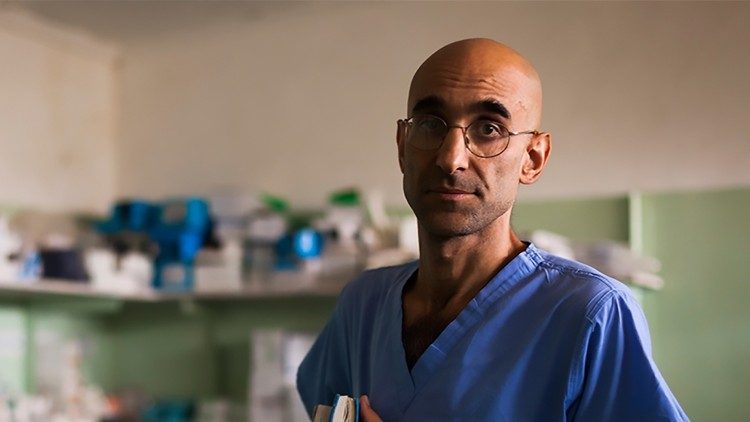The Nuba Mountains Doctor
American medical doctor. He chose to practice his profession in a particularly difficult area of Africa - Sudan - more precisely in the Nuba Mountains. Out of nowhere, he has opened a hospital and every day he is at the service of the populations most in difficulty. His dedication earned him the 2017 Aurora Prize.
Jan 02, 2020

By Godfrey B. Kampamba
The desire to serve in a desperate situation that needed help made a young American lose his own heart to Africa. Born and brought up in the sprawling city of New York, in the USA, Dr. Tom Catena’s graduation from Duke University Medical College only meant one thing: service to the needy in a rural setting. It did not matter where this place would be located on the globe. Therefore, after a short stint as medical doctor in the US Navy, it was time for Dr. Catena to set out on a mission.
In an exclusive interview, Dr. Catena highlights some of the heart-rending experiences of a medical doctor trying to make things work in the dangerous and frustrating Nuba Mountains in Southern Sudan, where only faith has so far kept everything together.
Although the lot fell on Kenya, fate pointed to Southern Sudan as his final base. In the last decade or so, Dr. Tom Catena has become a household name in the Nuba Mountains and beyond, because of his selfless service to the poor. He founded and runs the 430-bed Mother of Mercy Hospital, which stands out in the middle of nowhere. This health facility has been responsible for the survival of many of the victims of the violent campaigns of Sudan’s former dictator, Omar al Bashir.
Dr Catena also concentrates much of his effort on humanitarian affairs and dreams of leaving the Nuba Mountains a better place than he found it.
Dr. Catena has made it clear that he has chosen to live in Africa and that he likes the idea of staying in one place and becoming part of the community. Considering the fact there is no lack of trouble spots in the world, and Africa in particular, one could ask what prompted him to leave the comfort of his home in New York to go and live in as hostile a place as the Nuba Mountains.
“It is interesting”, he says, “because when I was in university, before I even became a medical doctor, I always wanted to be a missionary and that desire to be a missionary is what prompted me to actually go into medicine.” He explains further that upon graduation from medical school, and after having worked in the US Navy for four years, he joined the New York-based Catholic Medical Mission Board. This would later act as a springboard making his dream to work in a rural area come true.
“So, I chose a place in rural Kenya, a place called Mutomo. It is a hospital run by the Irish Mercy sisters”, he says. Before long, Dr. Catena moved to the city of Nairobi, where he ended up working for five years. “When I was in Kenya I kept hearing about Sudan, about the conflict in Sudan, that this place has been destroyed by civil war, and that there were no health facilities there”, Dr. Catena says, adding “I heard that there were some NGOs working there but were leaving because of the conflict. To me it sounded like a very desperate situation.”
Regardless of the news coming out of the Nuba Mountains, the reality he was hearing about attracted him so much that he did everything to find out more about the place. Bishop Macram Max Gassis, the now-retired bishop of El Obeid, was at the time building a hospital in the Nuba Mountains, and “I heard about it through a friend of mine. So I contacted his office”, Dr. Catena explains. It did not take long before “I went up and we opened up the hospital and started operating in 2008.”
It is curious that throughout his sharing, Dr. Catena betrays an unflinching affinity to Christianity and his faith. “I am what you may call a cradle Catholic”, he says. He explains further saying “I grew up as a Roman Catholic. My parents are very devout believers. My father was a great example. He went to Mass every day and really brought us up in the faith, together with my mum. They were very strong believers and I think I grew up with that idea.” He also speaks of a moment in university when he mingled with evangelicals, and one would fear he would convert to be like them. But he says he gives credit to that friendship and encounter with evangelicals because, according to him, “through these evangelicals, I got the idea of being a missionary. Then after college, I went back to this more orthodox Catholicism. So I think I have been very fortunate my whole life, to have always been with people who are always strong in the faith, to kind of guide me and to mentor me.”
Ever since he moved to the Nuba Mountains, Dr. Catena has made his medical services to the needy the most important thing in his life. His typical day, in the middle of nowhere, speaks mountains. “Basically, I get up around 05.30 am, and we are fortunate enough to have a priest with us. So, I go to Mass every day.” Dr. Catena recites the Rosary on the way to church for Mass, which begins at 06.30 and ends at 07.00. After Mass, he grabs something quick to eat at home before going to the hospital to start to work at 07.30.--Vatican News







Total Comments:0